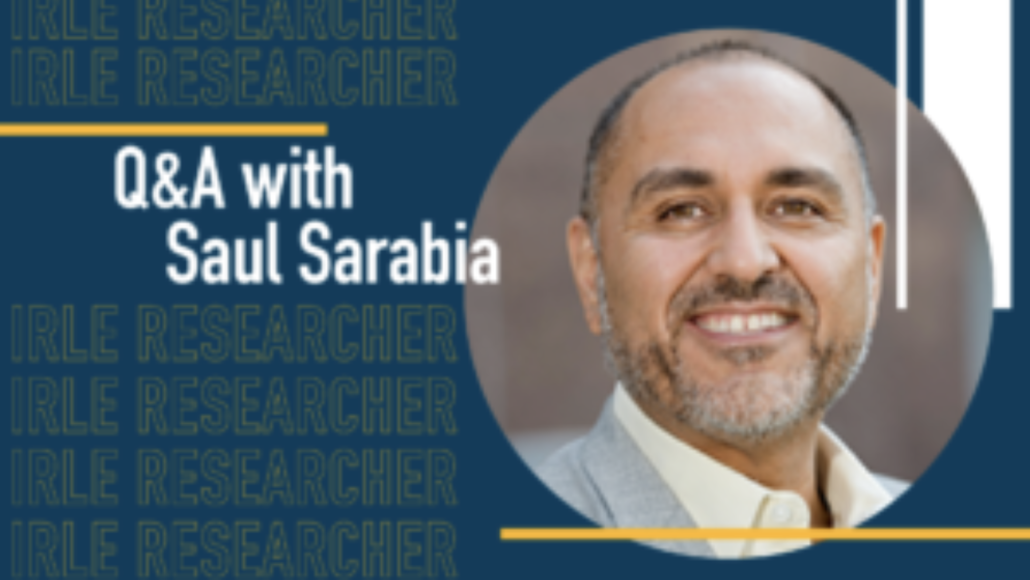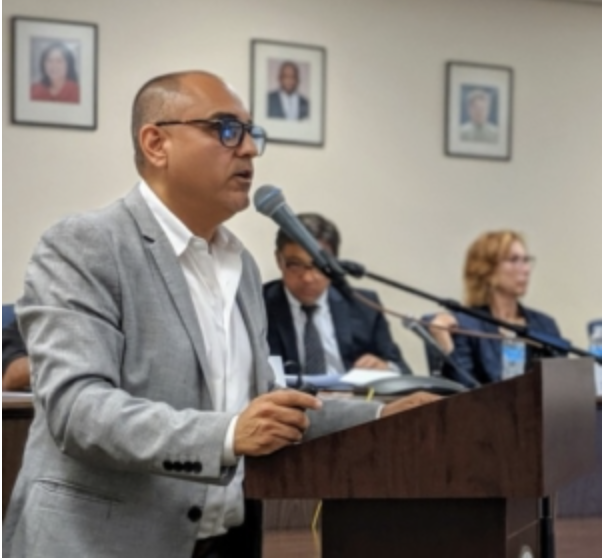Q&A with Criminal Justice Reformer Saul Sarabia
Edith Elenes and Vanessa Codilla | January 6, 2020
Saul Sarabia served as chairperson of the Probation Reform Implementation Team. He works to end structural racism, and discrimination by developing leaders, teaching, and engaging in collective action to change laws.
Can you tell us a bit about yourself such as your background and education?
I came here to UCLA for my undergraduate major in communication studies in 1993 and I also completed my law degree here in 1996. I was interested in the role of the mass media in shaping public policy and public opinion, particularly around poverty issues and racial justice issues.
I had the great fortune of participating in a year long program through the honors program that allowed me to take a class on how the US deals with people living in poverty. It was a colloquium on urban poverty and public policy. Then you could do research, such as a graduate level seminar for undergrads to become familiar with all the literature, theories, and history relating to poverty.
This had a huge impact on me because I grew up poor and prior to this program I felt like my studies were incredibly disconnected from poor communities. I was unsure if I could use my UCLA education in the types of neighborhoods I grew up in which dealt with issues that affected working people such as my parents who worked in factories. Growing up, we had health insurance and made minimum wage, but used food stamps because what they earned barely made it to the end of the month. My parents only had a 6th grade education and they were from a very small ranch in Mexico, so they didn’t know how the education system worked. I’m the youngest of 5 but all of my brothers and sisters had dropped out in the 11th grade and started working early. A lot of those factors increased my interest in some of these issues.
How did your experiences at UCLA affect your career path?
Getting involved in student activism is what shaped my career course in supporting social justice movements. My main area of work as a student was being involved with La Gente, a Chicano/Latino newspaper on campus, where I learned a lot about the racial history of the country and became editor when we had a hunger strike for ethnic studies and Chicano studies. During those five years as an undergrad, I was very much shaped by working with other student activists and their backgrounds supporting different causes on and off campus.
Then as a law student, I was able to focus my studies on a field that was emerging at the time – Critical Race Theory. I had the privilege of being in one of the first critical race theory seminars with one of the founders in the field, Kimberlé Crenshaw. Her introduction into concepts of critical race theory and intersectionality, along with my training in urban poverty, gave me a way to approach my work by focusing on structural racism and systemic change. I became excited about organizing and community-based public policy.
Can you tell us a little bit more about the social movements you were involved with and which ones impacted you the most in your career?
The movement I’ve been most involved with is restoring basic rights to people with criminal records and those who are incarcerated. When I started my studies at UCLA in the 80s, the Reagan years were filled with so much oppression. There was deep systemic oppression of racial minorities in terms of police abuse and the War on Drugs.
Today California’s economy can be directly tied to state-run, unionized prisons. We had the biggest building boom of prisons, so we had so many prisons to fill. The majority of people are state prisoners in the system where employment has been built around their incarceration. We are researching what is happening with the incarceration and oppression of people of color while thinking about ways to help workers who were recruited into the failed policies on the War on Drugs. We want to imagine what work could look like in the future without mass incarceration.
What are some questions regarding criminal justice reform are you exploring in your work?
We aim to downsize the footprint of the criminal justice system. Now that we are going into a post-war on drugs and post-incarceration world, what is it that we can do to generate wisdom and knowledge for workers to be able to transition into a decarcerated California? Without engaging with the workers, it will be difficult to get a decarcerated future. Should we redesign work for those people? There are lots of important labor and employment questions attached to the decarceration agenda that should be explored.
Do you have any advice for a student who would want to follow a career path in your field?
What really marks me as a UCLA student is integration of theory and practice. We have a responsibility to study and understand the past and how it relates to current situations before we go out there. First, take courses that help you connect the dots.
The second thing is to benefit from something outside of classes. Try to navigate the explanations that are being offered on social media. But, these can be extremely harmful because of conflicting interests. There are people who are just trying to sell you an idea, political orientation, or movement that may not serve you or the broader society directly. This is just part of the reality of young people who are coming into contact with information about history, social issues, and the world through social media.
To me, aside from the incredible academic work and integration of theory and practice, what prepared me the most was being in political struggle with other students. Get involved in the university or outside of it and try to make sense of the world with people who are different from you and challenge you, but also respectful of differences. To me, that engagement and formation as a young person made all the difference.
The last thing I’ll say is that although it is community work, it can be very isolating and lonely if you do not give yourself a work-life balance. You need to pay attention to your own human needs before you save the world. The thing that has sustained me are the relationships that I built with people who, in the end, want to make positive change and social justice work.
Disclaimer: This interview has been edited and condensed for clarity.



